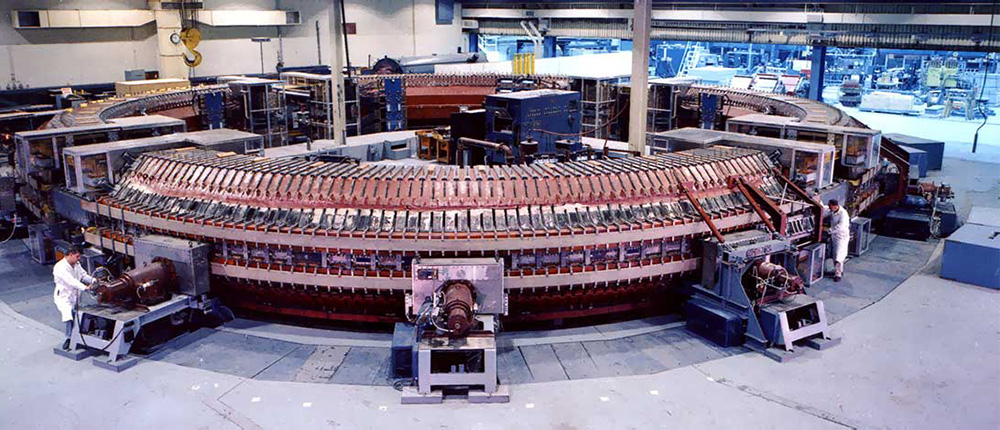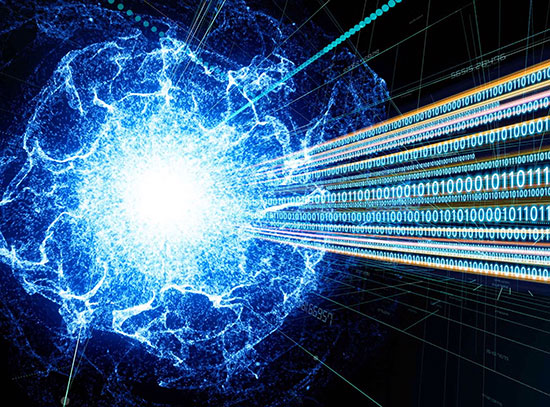Department of Energy Announces $16 Million for Traineeships in Accelerator Science & Engineering
Research projects will partner students with DOE national labs to help students develop hands-on research experience
May 1, 2024
 enlarge
enlarge
The Cosmotron, which operated at Brookhaven Lab from 1952 to 1966, was the first accelerator in the world to send particles to energies in the billion electron volt, or GeV, region.
Editor’s note: The following funding announcement was originally issued by the U.S. Department of Energy (DOE). Vladimir Litvinenko, a senior scientist in the Collider-Accelerator Department at DOE’s Brookhaven National Laboratory and a professor of physics in the Physics and Astronomy Department at Stony Brook University, is leading one of the four awarded projects. His traineeship, the Ernest Courant Traineeship in Accelerator Science & Engineering, will include participation from scientists and engineers working across multiple areas of accelerator research and operations at Brookhaven Lab. For more information on Brookhaven’s role in this project, contact Stephanie Kossman (skossman@bnl.gov, 631-344-8671).
WASHINGTON, D.C. - Today, the U.S. Department of Energy (DOE) announced $16 million in funding for four projects providing classroom training and research opportunities to train the next generation of accelerator scientists and engineers needed to deliver scientific discoveries.
U.S. global competitiveness in discovery science relies on increasingly complex charged particle accelerator systems that require world-leading expertise to develop and operate. These programs will train the next generation of scientists and engineers, providing the expertise needed to lead activities supported by the DOE Office of Science. These programs will develop new curricula and guide a diverse cadre of graduate students working towards a master’s or Ph.D. thesis in accelerator science and engineering.
“Particle accelerator technology enables us to tackle challenges at the frontiers of science and benefits our nation’s high-tech industries, modern medicine, and national security,” said Regina Rameika, DOE Associate Director of Science for High Energy Physics. “The awards announced today will help to develop the workforce to advance the state-of-the-art in accelerator technology while helping deploy these technologies in commercial applications in the health, security, environmental, and industrial sectors. These programs at American universities will help ensure that our nation has a skilled and diverse workforce to develop the accelerator technology needed to meet the scientific challenges of the future.”
Research projects will partner students with DOE national labs to help students develop hands-on research experience. These projects include opportunities for graduate research across a broad range including beam physics at the systems level, technologies of large accelerators, high reliability design and failure analysis, and the fundamentals of project management. Students may also explore the material science, design methodology, fabrication techniques, and operations constraints needed to produce and operate superconducting radiofrequency accelerators. Additional research opportunities in the areas of high-reliability, high-power radiofrequency systems and large-scale cryogenic systems, particularly liquid helium systems, are available through these programs.
The projects were selected by competitive peer review under the DOE Funding Opportunity Announcement for DOE Traineeship in Accelerator Science & Engineering.
Total funding is $16 million for projects lasting up to five years in duration, with $3 million in Fiscal Year 2024 dollars and outyear funding contingent on congressional appropriations. Funding is provided by the High Energy Physics and the Accelerator R&D and Production programs. The list of projects and more information can be found on the High Energy Physics program homepage and the Accelerator R&D and Production program homepage.
Selection for award negotiations is not a commitment by DOE to issue an award or provide funding. Before funding is issued, DOE and the applicants will undergo a negotiation process, and DOE may cancel negotiations and rescind the selection for any reason during that time.
2024-21863 | INT/EXT | Newsroom









